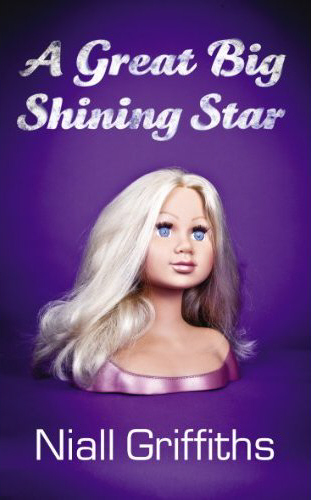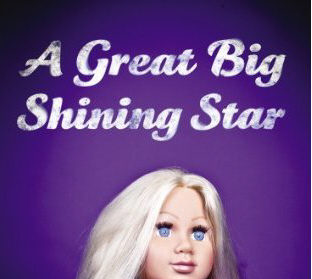Craig Austin takes a look at Niall Griffiths’ novel, A Great Big Shining Star, which explores celebrity culture, politics, and the search for an indefinable perfection.
‘Fame is a vapour; popularity is an accident; the only earthly certainty is oblivion’ – Mark Twain
‘Hoes have to know 80% of men have a sat nav hoe alert device programmed into our brains you can’t fool us lol #beat&delete’
– Twitter post by footballer, Leon Knight
Politics, literature, rock’n’roll; the 21st century has successfully and expertly diluted all manner of things, but perhaps nothing so ruthlessly as the notion and/or definition of ‘celebrity’. Whether it’s the seemingly interminable procession of performing seal try-out shows perpetuated by lowest-common denominator TV, or the almost weekly proliferation of the type of glossy schlock-horror magazines in which malicious spite cowers behind the transparent façade of ‘gossip,’ it’s painfully evident that over a period of little more than two decades the term has been expediently cannibalised to the point of utter irrelevance. In lieu of Elizabeth Taylor and her enigmatic reflection that “I really don’t remember much about Cleopatra, there were a lot of other things going on,” we are now encouraged to orbit the inane existence of ITV2 circus act and absurd ‘cage fighter’, Alex Reid, a man who feels the need to share with us insights as critically imperative as, “I’m going to have Botox above my eyes, even though I like my fighting scars there. I’m definitely going to have my nose fixed, even though I like it the way it is.”
Fittingly, it is the operating table of a private clinic, the ‘fixing’ of such a nose, and the futile search for indefinable perfection that constitutes our unrelenting initiation into A Great Big Shining Star, Niall Griffiths’ latest novel, one so unremittingly bleak in its deconstruction of our society, its hollow values, and what the author views as its ultimately catastrophic destination, that Twain’s predetermined ‘oblivion’ seems almost consoling by comparison. Grace Allcock is barely 18, yet has already embarked upon the path to physical redefinition via the power of commercial rhinoplasty. Urged on by a hay-for-brains scally boyfriend of no fixed intellect, a predatory reptilian agent, and a mother so recklessly clueless that it would be almost benevolent to characterise her as an enabler – when ‘pimp,’ is almost certainly more accurate – we track the progressive manipulation of Grace via the vacant, coke-addled strata of footballers’ plaything, lads’ mag sweetheart, and wet t-shirt purgatory. A passage swiftly propelled by her humiliating three-man ‘roasting’ at the behest of a pack of homo-erotically charged professional footballers and the subsequent exposure of the resultant camera phone footage via YouTube’s global platform. Niall Griffiths’ sneering ‘idol as hate figure’ portrayal of the three footballers (and footballers in general), their vanity, their arrogance and their obscenely colossal wealth, will resonate powerfully with many, and with good reason. For the uninitiated it’s fair to say that the publisher’s legal team may have knocked off early on the day that the almost forensically familiar description of the players in question was passed by them for approval. It is, however, the recording of the sex act, the female as ‘meat puppet,’ its gleeful proliferation, and the whole notion of extreme and misogynistic ‘gonzo porn’ that preoccupies the mind of the author throughout. Griffiths evidently fears for the future social and sexual mind-sets of our children when acts so cruelly and fantastically degrading that they wouldn’t necessarily have been out of place within the walls of Dachau or Treblinka can now be so easily viewed by pre-teens, at the back of a bus, on the way into school; a reality he is not shy to detail in often compulsively pathological terms. To the mother of ‘Gracie’ however – a subtle, but important post-‘roasting’ transformation – the worldwide humiliation of her daughter, her freshly-tattooed body pummelled and violated for the hyena-shrieking sport of contemptuous wealthy young men, is merely a tolerable price to pay for her offspring’s fast-tracked escalation to air-brushed magazine-endorsed notoriety. “Got responsibilities now, yeah?” she reminds her scarcely adult daughter in the vacant modern-day vernacular of saying everything and nothing at exactly the same time, “Role model, yeah?”
“I see a world in which people don’t want to be themselves”, says Kurt, the deeply troubled cipher/narrator of A Great Big Shining Star through whom Griffiths articulates, in often stomach-churning terms, much of his revulsion at the basest and most depraved facets of our contemporary existence:
I see a world in which white kids talk in patois. Middle-class people believe that they are poor, that they possess a kind of raw emotional authenticity when they were brought up in some lawned and pebble-dashed suburb. You can become Other. Pete Burns. Michael Jackson. What’s her name, that gargoyle who fucks footballers… Could be one of millions.
As the caretaker at Grace’s former school, and a man pre-occupied with his own recurrently troubling recollections of the same silicone-enhanced internet phenomenon as an infant, Kurt simultaneously struggles to confront the tortuous recall of his failed attempted suicide; one that almost resulted in the death of his own young daughter. His fear of what the future, the adult world, might hold for his own child is all-consuming and when both characters’ storylines seek to converge at the novel’s denouement the impact is both horrific and apocalyptic. Kurt is no avenging angel however. His desperate moral hypocrisy is reflective of us all and emblematic of a bear-baiting daytime television audience all too quick to transfer its pent-up self-loathing rage upon the supposed ethical failings of others. His own obsession with trawling the internet for increasingly extreme and bizarre forms of pornography is seemingly intensified by Grace’s rising public profile and one routinely redefined in a series of shabby mental deals that he seeks to broker with himself. To take away the pain.

by Niall Griffiths
Though its litany of dead-eyed characters are resolutely apolitical A Great Big Shining Star is a single-mindedly political book in that it explores the true legacy of Thatcherism, the untethered capitalism of the soul some three decades down the line, and the ultimately incendiary impact of a consequence-free, ‘me first’ society of libertarian squalor, that views people as commodities and – perhaps, most potently – women as little more than product to be exploited. It’s maybe no surprise that an author who has utilised the source material of both Wales (his home) and Merseyside (his birthplace) within his work opts to return once more to Liverpool, a city whose historically hedonistic working-class quest for thrills, spills and an unpretentious good time has in more recent times begun to give way to the derivative pursuit of baby Bentleys, £1000 handbags and a magnum of Grey Goose ‘for the table.’ It’s a phenomenon not unique to Liverpool, however, and one that is extending its tentacles far beyond the once rarefied nightclubs of the nation’s capital. A credit-fuelled, everything-for-nothing culture of ‘me’ and of ‘now.’ Spoilt children playing at being bloated adults, the Mike Teavees and the Violet Elizabeth Botts of Alma de Cuba and whatever soulless Kensington cattle market that Prince Harry and his braying pack of pencil-necked vampires have deigned to descend upon that week.
Celebrity as career choice, intellect as handicap, compassion as weakness, these are the values that now form the foundation of the world in which we live. When Orwell warned that, “if you want a vision of the future, imagine a boot stamping on a human face – forever” he wasn’t far off the mark. What he failed to predict was the obscene four-figure price tag that would hang from that boot, and the utterly meaningless ‘Maori’ tattoo that would be etched into the leg within it. The Orwellian term that resonates most persuasively however is his reference to an era of ‘universal deceit,’ a precarious house of loaded cards built on foundations of poison, hypocrisy and exploitation. In such times, Niall Griffiths’ attempt at exposing the ultimately ugly truth in A Great Big Shining Star is in itself a revolutionary act.
You might also like…
Gareth Kent reviews Niall Griffiths’ haunting depiction of modern Welsh society encumbered by austerity and disconnection in his new novel, Broken Ghost.
Craig Austin is a regular contributor to Wales Arts Review.











